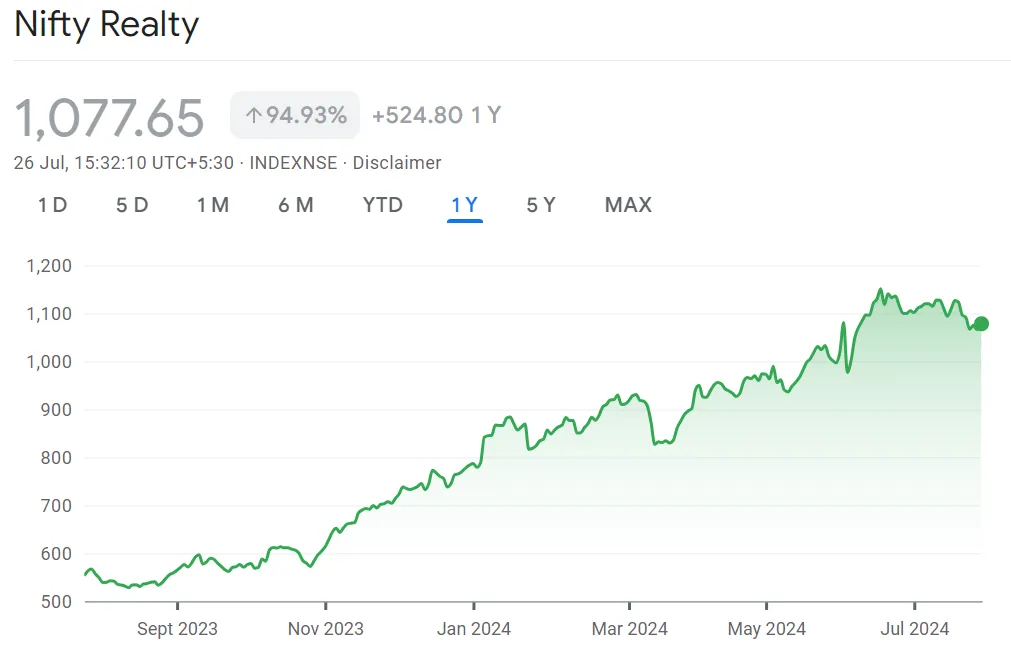Market News
Does removal of indexation benefits pose threat to real estate stocks?

4 min read | Updated on July 27, 2024, 17:53 IST
SUMMARY
The Nifty Realty index has jumped 100% in the past one year given a remarkable boom in the sector due to various factors such as urbanisation and infrastructure development, evolving demographics, and changing lifestyles, among others.
Stock list

The real estate sector shows promise, with a projected 9.2% compound annual growth rate (CAGR) from 2023 to 2028.
Real estate stocks have been an apple of investors' eye over the past 12–15 months. The Nifty Realty index has jumped nearly 100% in the past one year given a remarkable boom in the sector due to various factors such as urbanisation and infrastructure development, evolving demographics and changing lifestyles, technological advancements, and government initiatives such as Housing for All and the Smart City Mission.
Industry observers note that overall, the real estate sector has become more professional and organised. The transparency levels have increased, thanks to the implementation of RERA, and there has been a decent amount of consolidation in the space.
RERA stands for Real Estate Regulatory Authority Act.
"Every worthwhile micro market has a large regional or national player. Real estate companies now have a factory-like model where the project churns faster, thus getting a better return from the project performance than from speculative returns, which was the cornerstone of real estate about two decades ago," notes Ambareesh Baliga, an independent market analyst.

According to the India Brand Equity Foundation, the real estate sector shows promise, with a projected 9.2% compound annual growth rate (CAGR) from 2023 to 2028. 2024 is expected to drive growth with urbanisation, rental market expansion, and property price appreciation, it adds.
Given all these positives, the government's decision to remove the indexation benefits on the sale of properties in the Budget 2024–25 speech on July 23 came as a shocker, prima facie. The sentiment was visible in the stock market too, where realty stocks tumbled following the announcement, causing the Nifty Realty index to settle over 2.25% lower that day.
However, it turned out to be a knee-jerk reaction as the stocks did not build up the losses, and it has been business as usual so far, sans any huge swings.
Nevertheless, there are concerns among investors about the impact of the taxation changes on real estate stocks, with queries about whether they should be cautious going forward.
EXPERT TAKE
If one's investment horizon is 2–5 years, there is no need to panic, and they should stay with the stocks, experts said. However, it could have a sentimental impact in the short term as stocks may slip, they added.
Barring the removal of indexation benefits, there were a lot of positive announcements in the Budget such as ₹10 lakh crore investment into schemes for urban housing and lower stamp duty for female property buyers.
Besides, possible stamp duty reductions will also be a major positive trigger, says Amit Kumar Gupta, founder of Fintrekk Capital, a SEBI-registered research analyst.
Key cities that have higher stamp duty rates are Haryana (7%), Chennai (7%), Mumbai (6%), and Pune (6%).
Regarding lower stamp duty for female buyers, the analyst stated that people (ultra rich and HNIs) tend to distribute wealth. "One can have more registrations, there could be inheritance, which could be transferred to women, or during marriage, real estate can be given as gifts. Hence, all these things will come and have a favourable impact, not immediately but maybe two years down the line, when more clarity emerges,” the analyst told Upstox.
Even on the taxation front, it depends on what one is doing with the property. If they are selling one property and buying another, then it's not a problem, as one can save tax under Section 54EC. Further, there will be no impact on super-luxury apartments with ticket sizes of more than ₹10 crore since in last year’s budget, the indexed cost of acquisition was capped at ₹10 crore.
“I think they wanted to curb the speculation of real estate, so that may go up for certain sections, certain real estate where you are buying and selling very frequently, that will now be taxed at 20%,” Gupta adds.
Usually, taxation is a one-off thing, and it will be absorbed by the market eventually, the expert said.
Baliga says the removal of indexation benefits will not be a major negative factor since most of the buyers are end users rather than investors, and such end users would sell when they want to upgrade to a bigger home, thus saving on capital gains tax.
The lower rate is also beneficial for those markets that have seen a sharp move in real estate prices in recent years, beating inflation.
"So overall, I don’t see any negative effect on real estate stocks. It could have a sentimental impact in the short term. From an investment angle, REITS have become more attractive," Baliga adds.
About The Author
Next Story


